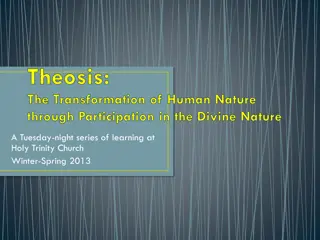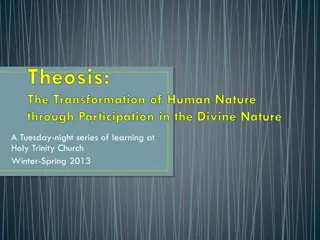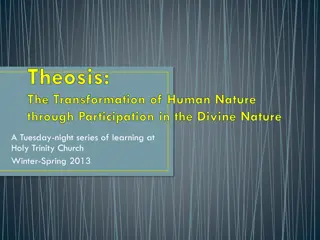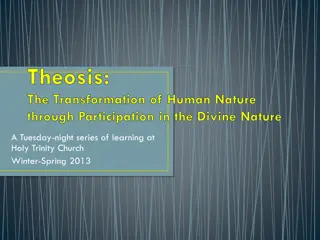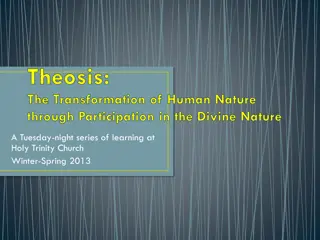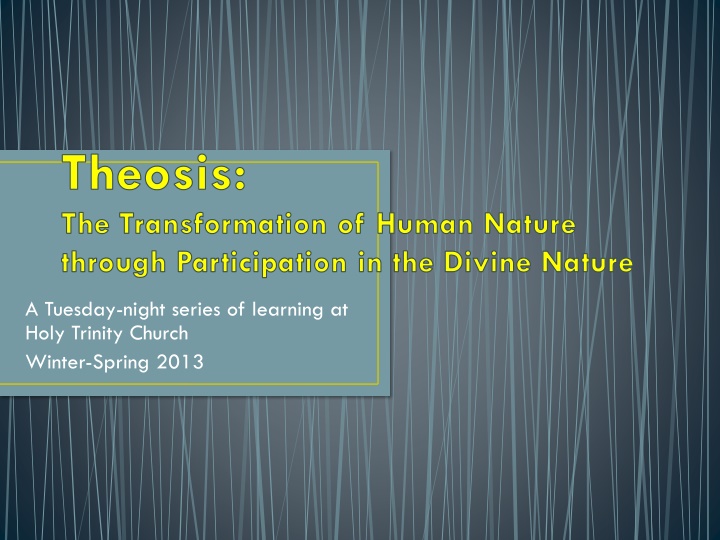
Transformation of Human Nature in Alexandrian Christian Tradition
Explore the doctrine of deification in Alexandrian theology, influenced by Gnosticism and Middle Platonism. Learn about key figures such as Clement and Origen, and their teachings on realizing the divine within oneself through Christ. Discover the inward journey towards reintegration with the divine and the unique philosophical framework of the Alexandrian tradition.
Download Presentation

Please find below an Image/Link to download the presentation.
The content on the website is provided AS IS for your information and personal use only. It may not be sold, licensed, or shared on other websites without obtaining consent from the author. If you encounter any issues during the download, it is possible that the publisher has removed the file from their server.
You are allowed to download the files provided on this website for personal or commercial use, subject to the condition that they are used lawfully. All files are the property of their respective owners.
The content on the website is provided AS IS for your information and personal use only. It may not be sold, licensed, or shared on other websites without obtaining consent from the author.
E N D
Presentation Transcript
Theosis: The Transformation of Human Nature through Participation in the Divine Nature A Tuesday-night series of learning at Holy Trinity Church Winter-Spring 2013
The Alexandrian Tradition The doctrine of deification as it developed in Byzantine theology and as we know today is essentially an Alexandrian theologoumenon. Justin and Irenaeus laid foundations, but the development of a technical vocabulary and the philosophical framework were greatly aided by the allegorical exegesis of Scripture which was a characteristic of Alexandrian Christianity. The Alexandrian environment was unique: the most important intellectual center in the Mediterranean, above all famous for its philosophical schools, which developed Platonic thought in what today is called Middle Platonism
The Alexandrian Tradition The key figures of Alexandrian Christianity were Clement and Origen. Clement was the innovator, Origen the brilliant teacher and biblical scholar who, building on Clement, established deification as the Church s most striking metaphor of salvation. Alexandria was also the most important center for the growth of Gnosticism. The discovery in 1945 of the Nag Hammadi texts, a collection of spiritual writings hidden in the late 4thor early 5thcentury, has given us a more precise appreciation of the esoteric and speculative spiritual yearnings of Gnostics.
The Alexandrian Tradition The Teachings of Silvanus. A master urges his disciple to discover the divine element within himself: From now on, return to your divine nature Do not bring grief or trouble to the divine which is within you. The mind is in the image of God. To live by the mind raises man above the angels. Christ is essential because one cannot know God except through Jesus Christ, who has the Father s image. Silvanus says that through Christ the rational man makes himself like God, even while still living on earth. For Christ who has exalted man became like God, not in order that he might bring God down to man, but that man might become like God.
The Alexandrian Tradition Gnostic heavenly ascent is part of the divine element in the human make-up, at least of the elect. Awaken your divine part to God, says Zostrianos, for the ascent is primarily inward. Understand yourself as you really are, says Allogenes. Withdraw to reality and you will find it standing at rest and still. Zostrianos, in his vision, rises by a series of purificatory baptisms through successive grades of angelic being until his soul is eventually reintegrated with the divine, anticipating thus in the inward journey the soul s ascent to the heavenly world after death. Clement integrated Gnostic elements into an orthodox (or proto-orthodox ) scheme.
Clement of Alexandria (c. 150-215) He was the first church father to speak of . According to Clement, the Christian is deified by a heavenly teaching; when fully perfected after the likeness of his teacher, he becomes a god while still moving about in the flesh ( ); and at the end of his life he is enthroned with the other gods in the heavenly places. Clement teaches a supremely transcendent God, in whom participation is not a natural relation, as the founders of the heresies declare; yet by Clement s teaching, the human person has divinity as its telos.
Clement of Alexandria He echoed Irenaeus exchange formula , saying that the Word now speaks to us having become man in order that you too may learn from a man how it is even possible for a man to become a god ( , , ). The Scriptures are sanctifying and deifying ( ), for through them God conforms human beings to his own likeness. By listening to the Word and meditating on the Savior's heavenly mode of life, we are deified ( ).
Clement of Alexandria That person with whom the Logos dwells and who does not put on paint or makeup but keeps the form of the Logos and is made like God, that person is beautiful as opposed to beautified. There is a true beauty which is God; and that person becomes a god because God wishes it. Heraclitus was therefore right to say: Men are gods and gods men. It is the same Logos. This is a manifest mystery: God is in man, and man is a god, and the mediator fulfils the will of the Father. For the Logos common to both is a mediator, and at the same time Son of God and Savior of men, God s servant and our pedagogue.
Clement of Alexandria The gods who are sons of the Most High are now perfected Christians who have conquered the passions: God stood in the congregation of the gods; in their midst he judges gods (Ps. 82:1). Who are these gods? They are those who are superior to pleasure, who rise above the passions, who have a precise knowledge of everything that they do, who are gnostics, who transcend the world. Then comes: I said you are gods and all of you sons of the Most High (Ps. 82: 6). To whom is the Lord speaking? To those who have detached themselves as far as possible from everything human.
Clement of Alexandria Plato rightly says that he who devotes himself to the contemplation of the ideas will live as a god among men. The intellect is the place of ideas, and the intellect is God. He therefore called him who contemplates the invisible God a living god among men. For when the soul has transcended the created world and is alone by itself and associates with the Ideas, like the coryphaeus in the Theaetetus, it contemplates the will of God, in truth alone wise, while the rest flit like shadows. If knowledge is the perfection of man as man, love is the perfection of man as god. The pure in heart will see God and love him in perfect contemplation.
Clement of Alexandria In Justin and Irenaeus human beings are called gods only in connection with Psalm 82:6; they become gods in principle through participatory union with Christ in baptism. Clement introduces a new element: Besides being those whom God has adopted, the gods are also those who have become like God. He applied Psalm 82: 6 not to the baptized but to those who have risen above the passions. These perfected Christian Gnostics are called gods for the most part without reference to Psalm 82. Their divine status is not postponed to the next life but begins here and now.
Clement of Alexandria A god, then, is a person who turns to truth after hearing the Scriptures, who becomes like Christ his teacher by imitating the beauty of the Logos. He must be baptized and obedient to the Church s teaching. But he must also be capable of striving for perfection in contemplation and the ethical life. Through the contemplation of the ideas , he must transcend the corporeal state, so that when he has attained the highest level of contemplation he may finally be enthroned with the other gods . Through the mastery of the passions he must attain an interior unity and freedom from desire which resembles the unity and autonomy of God.
Clement of Alexandria Christ came not so much to undo the effects of the Fall as to consummate the Father s love for humankind. Deification is twofold: it has an ecclesiastical aspect in so far as it is brought about by Christ, and a philosophical aspect in so far as it is the product of intellectual and moral effort. Clement s use of the word theoi reflects this dual approach. The gods are the baptized in whom the Logos dwells, and also those who through the practice of philosophy have mastered the passions and become like God.
Origen of Alexandria (c. 185-253) Unlike Clement, Origen was not a convert from paganism. He was raised in a Christian home. His focus was on biblical exegesis rather than appeal to philosophy. He was the first writer to quote 2 Peter 1:4. He used deification language ( ) as metaphor for salvation, not as philosophical terminology. May you too be a partaker and ever increase the participation, that you may say not only, We have become partakers of Christ ( ), but also, We have become partakers of God ( ). (Letter to Gregory Thamauturgus)
Origen of Alexandria In his treatise On Prayer, Origen investigates the use of the word in the Lord s Prayer. The normal English translation, daily , obscures its meaning in Greek. Origen connects with ( reality or substance ) and thus understands the bread that the Father gives as super- real or suprasubstantial . This spiritual bread communicates divine power to the intellect and the soul. He who partakes of the bread becomes a son of God. We therefore ought to pray that we may be deemed worthy of it, and by feeding on God the Word who was in the beginning with God may be deified ( ).
Origen of Alexandria The one God makes those in whom he dwells gods, the one Christ makes his adopted brethren christs, and the one Holy Spirit makes the saints holy spirits. For through participation in the Holy Spirit the Christian becomes holy and spiritual. Through participation in the Son of God he becomes a son of God replete with wisdom, righteousness, and logos. And in this way he/she shares in the divinity and with it the goodness, immortality, and incorruption which has its principle of origin in the Father alone, becoming a god by participation ( ) as distinct from the unique Savior, who is God by nature ( ).
Origen of Alexandria Deification in Origen s writings means the participation of rational creatures through the operation of the Son and the Holy Spirit in the divinity that derives ultimately from the Father. Only , the Father, is . Every other being who is is . The Son is unique, for he is in relation to the Father, but in relation to humans. Human beings need to become gods because only like can know like. Only as gods who have recovered the divine likeness can human beings contemplate the source of divinity, the Father, and partake of the life, goodness, immortality, and incorruption that are properly his alone.
Origen of Alexandria Participation in Origen means the dynamic reaching out of the Persons of the Trinity to rational creatures in order to endow them with the divine attributes. Humans respond by free choice to the divine initiative and progressively acquire the attributes of the Spirit and the Son. Less emphasis on ethics, more emphasis on ascent of the soul to God. God reaches out actively to human beings whose response, through participation in the life of the Trinity, makes them spirits, christs, and gods. Thus, Origen restated in metaphysical terms St. Paul s metaphors of participatory union with Christ.
Summary of Early Church Teachings Knowledge of the incarnate Logos & union with the Holy Spirit define deification in the Christian sense. The incarnation took place to complete the purpose of creation. Exchange idea: God became human to restore/enable our attainment to divine status. Adoption as children of God through Baptism enables us to obey God s commandments and live a life of virtue. The Eucharist is the means by which the body is nourished and deified and prepared for eternal life. Scripture as guide; liberation from the passions as evidence. Deification as metaphor of participation / salvation.
But so far we have seen no proof that deified persons actually exist!

